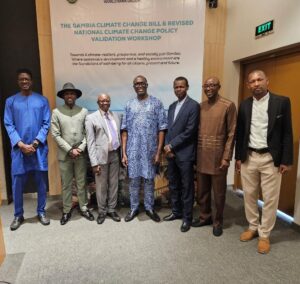Stakeholders from across The Gambia have unanimously validated the nation’s draft National Climate Change Bill and an accompanying National Climate Change Policy, marking a historic milestone in the country’s commitment to building a climate-resilient future.
The validation occurred following a comprehensive two-day national workshop held on August 18-19 at the Sir Dawda Kairaba Jawara International Conference Centre, with commendation for the role Natural Eco Capital from Nigeria played in achieving the national consensus on the landmark climate change bill and policy.
The new integrated framework offers a comprehensive legal and strategic roadmap to address the nation’s climate vulnerabilities, ranging from sea-level rise to coastal erosion, while charting a path toward a just, green, and blue economy. The Bill establishes a robust legal architecture, while the Policy outlines a clear, five-pillar strategy for implementation.
In her opening remarks, the Minister of Environment, Climate Change, and Natural Resources (MECCNAR), Rohey John Manjang, underscored the framework’s importance.
“These frameworks are not just documents; they are our national pledge to strengthen resilience and achieve The Gambia’s ambitious climate targets,” she stated, commending the inclusive process and the “crucial role of Natural Eco Capital, the lead consultant, for delivering the drafts despite a very tight deadline”.
Natural Eco Capital is a leading consultancy firm specialising in sustainable development, climate finance, and environmental policy, providing technical expertise to governments and organisations across Africa.
The validation is the culmination of an extensive consultation process involving government ministries, international partners like the World Bank and the International Monetary Fund, and vital civil society organisations.
A cornerstone of the new legislation is its focus on decentralised action, ensuring that climate action is community-led and locally relevant.
Lamine Jammeh, Director of the Climate Change Secretariat, underscored the principles guiding the framework.
“A just transition, which places the needs of Gambians at the forefront, is a non-negotiable principle,” he said. “Our participation in carbon markets must safeguard national interests with transparency and equity.”

The drafting process received financial support from the World Bank-funded West Africa Coastal Areas Management Program (WACA). Dr. Muhammed L. Sanyang, WACA Project Manager, hailed the workshop as a “significant achievement for climate governance” and reaffirmed the World Bank’s “unwavering commitment” to supporting the implementation of these landmark frameworks.
Key features of the validated Bill include a streamlined governance structure, the creation of a dedicated Directorate of Climate Finance, robust legal safeguards, including a Climate Change Division of the Environmental Tribunal, and a mandate to develop a legal framework for carbon rights to attract responsible investment.
With the validation complete, the Bill will be presented to the Cabinet and the National Assembly for enactment into law.





